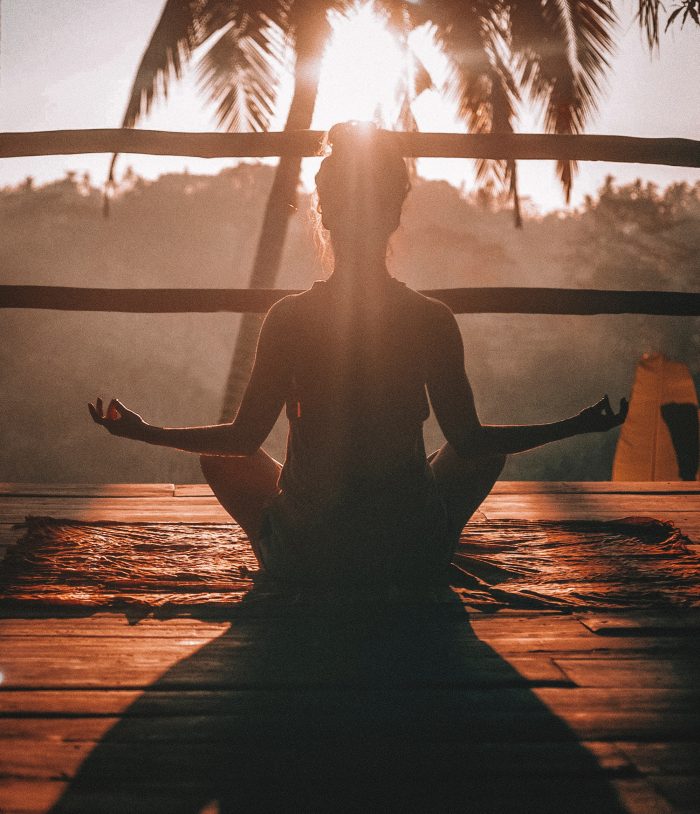It’s the New Year and many of us are taking on new practices and commitments that we feel will improve our everyday lives. One of the best practices we could take on is meditation. Meditation is a powerful and effective practice because it supports many of the other healthy lifestyle choices we want to have such as exercise, healthy eating, reducing stress, and better sleep. It works on the level of mind that supports all these habits in the first place. We’re creating space and time to just simply be with ourselves and breathe, this alone can be a powerful tool for supporting the change we want to see in our lives.
Obstacles
There are many obstacles to meditation. Many people feel they can’t meditate. Or they start a meditation practice and then give up after only a few weeks. Or they try too many techniques and can’t decide which one is best and so as soon as they sit down they feel confused. We may feel that we don’t have time to meditate, there is just too much to do (I feel you on this one) or we have resistance to meditation because when we finally sit down to meditate the flood of thoughts and anxiety is just too overwhelming and we give up out of frustration. There are many obstacles to meditation practice both before you get to the cushion and after you’re on it. Fortunately there are also antidotes for these obstacles and it begins with our commitment to get started or continue with a meditation practice.
Knowing your Why
It’s helpful to begin with the view, in other words, why are we meditating? If we’re meditating because we think we should, or because everyone else seems to be doing it, our motivation is not going to last very long. Our motivation has to come from a genuine place of wanting to work with our minds. In Buddhism, the motivation is to “wake up” and become more altruistic and enlightened. Our motivation does not need to be religious but could be something as simple as becoming less stressed or anxious, not being so dominated by our thoughts, or becoming more aware of our behaviors. Whatever our motivation, it’s helpful to keep this in mind because we’re going to need to remember it when we don’t feel like getting to the cushion.
Make it a non-negotiable
Do you decide whether or not you want to brush your teeth everyday? Or drink water or sleep or eat? Think of the everyday behaviors that have become so ingrained in your routines they become a non-negotiable, you just do them. Meditation should become like your hygiene routines, it’s just part of your daily routine, it’s mental hygiene. After 18 years of meditating, I literally feel like I forgot to brush my teeth when I don’t meditate. Some days it’s ok to go without it but if you go a few days without it you start to stink (you get in a bad mood). Make meditation one of your non-negotiables and its much more likely to become a regular practice.
Create a Space
It’s helpful to create a time and space for meditation. Have a cushion, maybe a candle and some incense, whatever you need to make the space feel clean, quiet, and sacred. It doesn’t have to be a permanent space if you don’t have the room or share space, but make it the same place and make the space inviting. You’ll also need a timer, you can use an app or a timer but its very helpful to set a timer for your session so you don’t have to think about it. If you’re just starting out 20 minutes is great, 30 minutes is better, 10 minutes is fine- whatever it is, just do it at the same time everyday. I find mornings to be the best because if I don’t do it right away it’s less likely I’ll get around to it. If you need to wake up earlier and have little coffee first, great, but better not to check email or get involved with your day because you’ll have more on your mind when you’re meditating.
Obstacles once you’re meditating
Actually making it to the cushion and creating time and space to meditate are the most challenging aspects of establishing and keeping a meditation practice, so if you’ve made it that far-awesome work!
Once you’ve set the timer, close your eyes and do a body scan for a couple minutes. Meditation is an embodied practice so we must feel how we’re feeling. Take deep breaths to ground yourself into your body. Begin to focus your mind on your breath, not in a tight way but in a spacious and relaxed way. When your mind wanders, simply bring your attention back to the breath. Thoughts are not a problem, whatever thoughts you’re having: judemental, anxious, annoyed, busy thoughts-they’re all the same. Just label them “thinking” and come back to the breath.
Meditation is about becoming familiar with our minds, it’s making friends with ourselves, even the parts that we don’t like. We may not like the fact that we’re always distracted or feel anxious, but in our meditation practice we have the opportunity to give these challenges space to just BE. Notice how you feel after your meditation practice. You can use the time at the end of your practice for gratitude and setting intentions for your day.
Of course, like anything, meditation takes consistent practice, and like any other habit once you start doing it regularly and consistently it becomes part of your routine. It helps to have support so you might want to seek out a meditation center or class near you.











Read 0 comments and reply